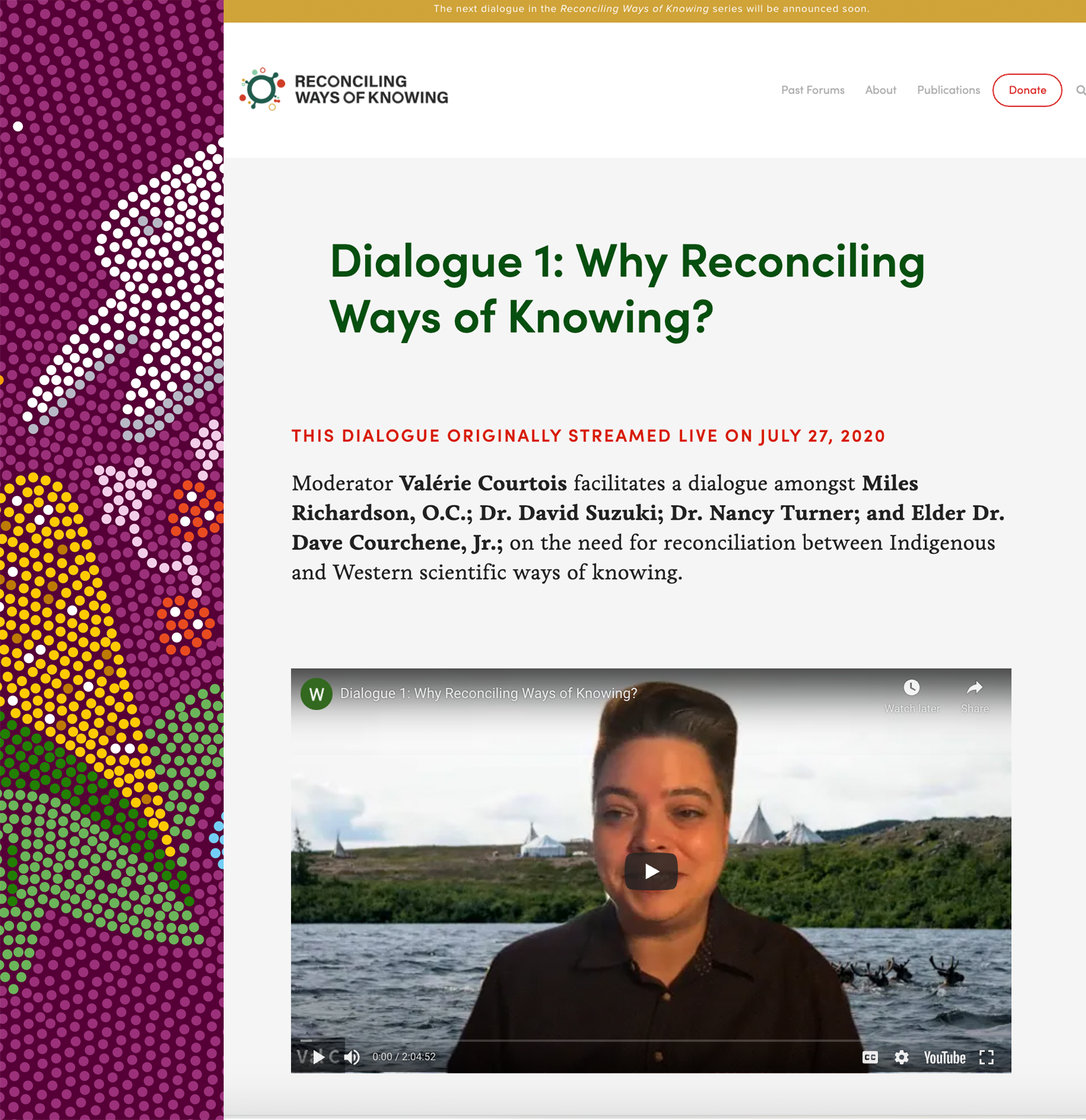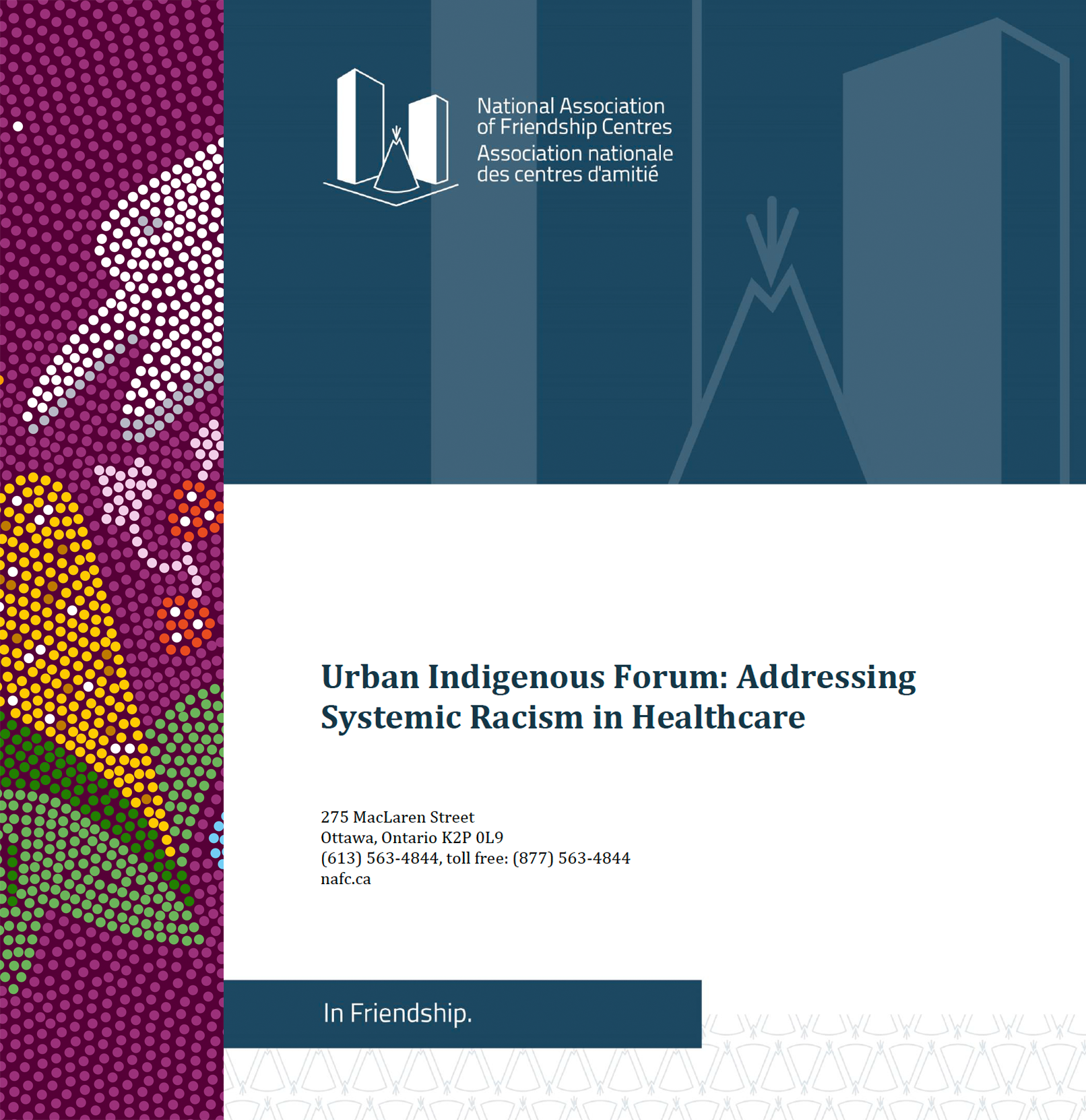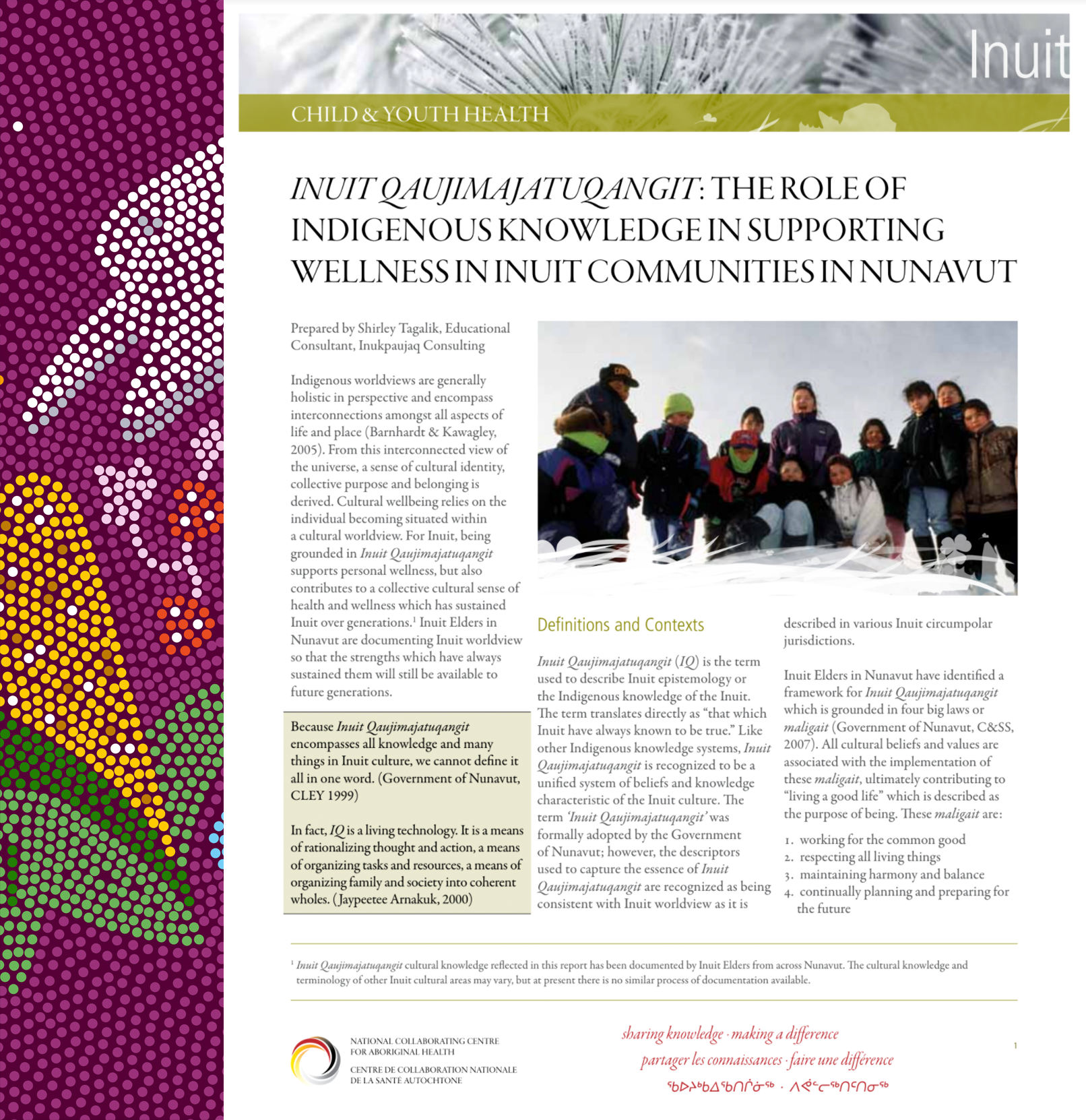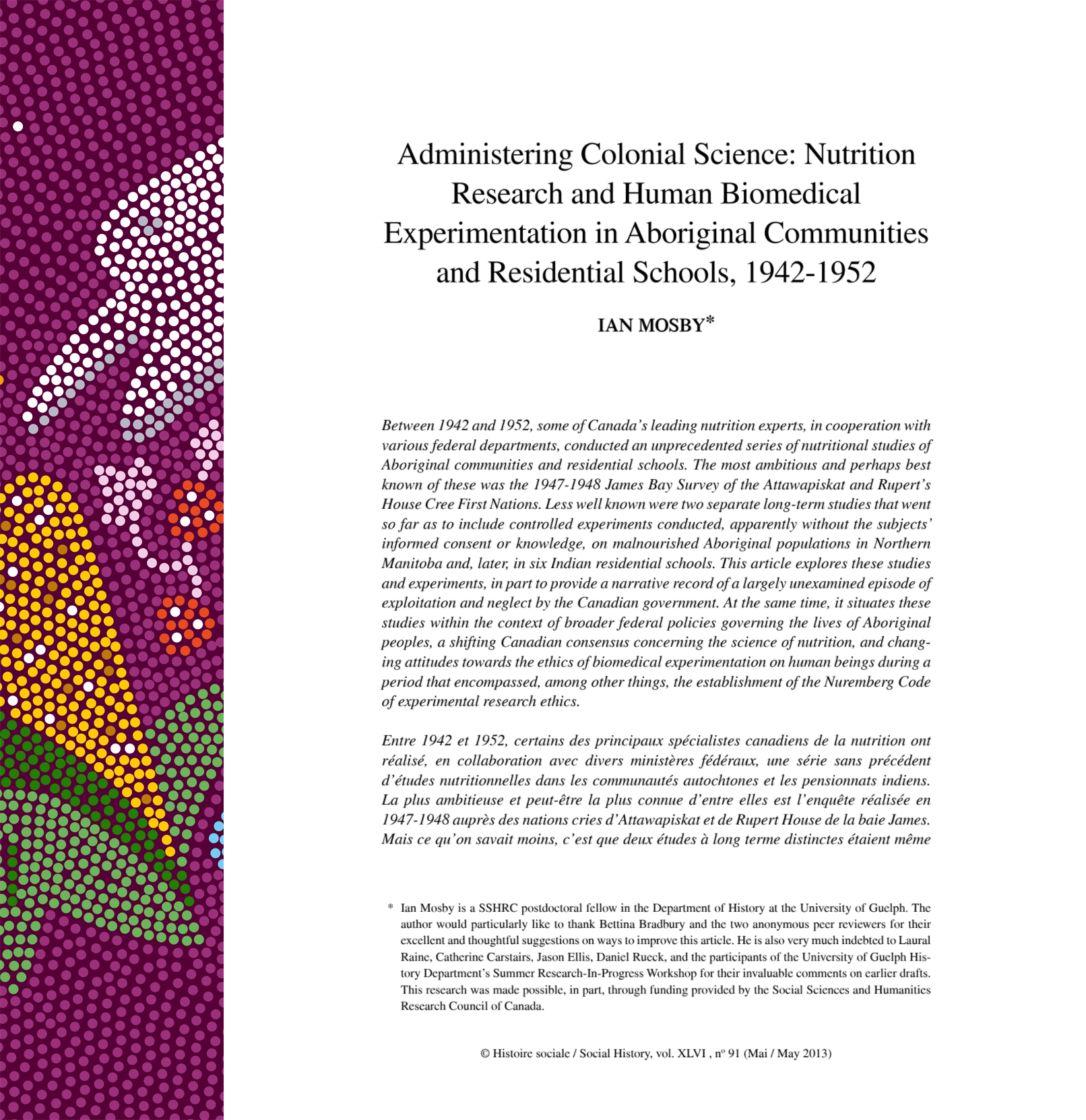On February 17, Nourish Indigenous Program Mangaer Mair Greenfield spoke with clinicians and students at the University of British Columbia's Faculty of Medicine.
Saskatchewan Health Authority Commitment to Truth and Reconciliation
Source: Saskatchewan Health Authority
Year: 2019
"The Saskatchewan Health Authority acknowledges Saskatchewan as the traditional territory of First Nations and Métis people, which includes Treaties 2, 4, 5, 6, 8, and 10.
We commit to fostering and maintaining respectful relations with all First Nations and Métis people. The Saskatchewan Health Authority acknowledges the pain, loss, and dislocation caused by the residential school system on individuals, families, communities and nations."
Reconciling Ways of Knowing Webinar Series
Source: Reconciling Ways of Knowing
Year: 2020
“In our first dialogue in this series, Why Do We Need to Reconcile Ways of Knowing? leaders working at the confluence of Indigenous and scientific knowledge and decision making discussed the events, issues and relationships that made it clear that a national-scale dialogue to facilitate just reconciliation between the ways of knowing and ways of being of Indigenous Peoples and Canadians, and their respective governments, is needed.”
Urban Access to Traditional Food: Understanding Wild Game
Source: Understanding Our Food Systems Project (Thunder Bay District Health Unit and the Indigenous Food Circle)
Year: 2020
“The Urban Access to Traditional Food: Understanding Wild Game documentary was developed to capture the relationships being built and work happening within the Thunder Bay District Health Unit and the Indigenous Food Circle and partner organizations around the topic of accessing wild game in an urban context. The short documentary provides viewers with the cultural importance of accessing traditional foods for Indigenous people and presents the barriers that organizations face, while focusing on a path forward for further collaboration and understanding.”
Indigenous Health Primer
Source: Indigenous Health Writing Group at the Royal College of Physicians
Year: 2019
The following document is designed to provide key approaches, ideas and background knowledge for health care providers, learners and educators in caring for Indigenous Peoples. The primer was written and edited by Indigenous and non-indigenous authors. Many of us are practising Indigenous physicians from a breadth of specialties. Each reference section is linked to detailed sources, the majority of which were created by Indigenous organizations. In addition to the theoretical and medical content, we aimed to include stories to illustrate the experiences of Indigenous Peoples in the health care system.
Creating Cultural Safety: Looking at Ottawa
Source: Wabano Centre for Aboriginal Health
Year: 2014
According to Statistics Canada, there were 19,200 Aboriginal Peoples living in Ottawa in 2011. This number has likely grown a great deal since. Aboriginal Peoples make up 2% of Ontario’s population. Despite the fact that the Canadian health care system is believed to be one of the best in the world, quality health care is not available for many Aboriginal people in Canada. Cultural barriers, fear and mistrust have hindered Aboriginal people from accessing appropriate and quality care which leads to poor health status. According to Anishnawbe Health Toronto, the Aboriginal population in Ontario “has generally noted that they have experienced culturally insensitive healthcare and have noted that at times they [are] also [met] with subtle and overt racism.”
Urban Indigenous Forum: Addressing Systemic Racism in Healthcare
Source: National Association of Friendship Centres
Year: 2020
The Urban Indigenous Forum: Addressing Systemic Racism in Healthcare was a crucial first-step in acknowledging the efforts it will take to ensure Indigenous people can access their right to healthcare with dignity and respect, however, our work does not end here. It remains our view that an Indigenous-led and community-driven process is essential in the path forward and compiling this report to share with Indigenous, Federal, Provincial/Territorial governments, our Partners, and the Canadian public as a whole is our first call to action. In this report you will find comments and suggestions from participants of the forum that range from personal experience, experience of advocates, professionals, and allies.
A Journey We Walk Together: Strengthening Indigenous Cultural Competency in Health Organizations
Source: First Nations Health Managers Association and Canadian Foundation for Healthcare Improvement
Year: 2020
Many health care organizations are familiar with the Donabedian1 model of healthcare quality – incorporating structure, process, and outcomes. This model recognizes that to see better outcomes and improvements in the quality of health services, there needs to be considered and purposeful improvements in structures (facilities, equipment, qualifications, care settings) and processes (care has been appropriate, acceptable, accessible, complete, competent).
Bringing Reconciliation to Healthcare in Canada: Wise Practices for Healthcare Leaders
Source: Dr. Lisa Richardson, Tracy Murphy; HealthCareCAN
Year: 2018
This HealthCareCAN Report discusses critical issues facing Indigenous Peoples in Canada, and the role that Canadian health leaders play in helping to close the health gap. It also presents wise practices for health leaders and organizations to address the health-related Calls to Action of the Truth and Reconciliation Commission of Canada (TRC) based on a literature review, interviews with key stakeholders, and case studies of several health care organizations. The term “wise practices” is widely used in Indigenous contexts to describe locally appropriate Indigenous actions that contribute to sustainable and equitable conditions.
Health Transformation Summit: Getting the Relationships Right: Health Governance in the Era of Reconciliation
Source: Assembly of First Nations
Year: 2018
The First Nations Health Transformation Summit took place February 13-14, 2018, in Toronto, Ontario on the Traditional Territories of the Mississaugas of the New Credit First Nation. The Summit was an opportunity for First Nations, the federal government, and provinces/territories to come together to develop shared priorities and determine next steps towards closing jurisdictional gaps in First Nations health. The First Nations Health Transformation Summit, Getting the Relationships Right: Health Governance in the Era of Reconciliation, is part of the Assembly of First Nations (AFN) efforts to facilitate relationship building, and highlight innovative First Nations built health programs, services and systems from across the country that have found success in overcoming jurisdictional gaps. With 429 in attendance, the Summit included First Nation delegates, AFN’s Chiefs Committee on Health members and health technicians, corporate and government officials, Elders, and other guests. The Summit was opened by Elder Valerie King and the Manitou Mkwa Singers and Drum Group.
Indigenous Ally Toolkit
Indigenous Health Values and Principles Statement
Source: Indigenous Health Writing Group at the Royal College of Physicians
Year: 2019
Racism is unacceptable in medical education and practice. The Indigenous health values and principles statement was created to complement anti-racism teachings. It was first introduced on July 4, 2013. Its purpose is to articulate clear and concise Indigenous health ideals and beliefs to guide the Royal College in advancing Indigenous health. The work was informed from extensive consultations with the Indigenous Health Committee of the Royal College members, key informant interviews with Indigenous stakeholders, and health care educators and organizations.
Social Determinants of Health Inequities in Indigenous Canadians Through a Life Course Approach to Colonialism and the Residential School System
Source: Paul Kim
Year: 2019
Indigenous populations in Canada have experienced social, economic, and political disadvantages through colonialism. The policies implemented to assimilate Aboriginal peoples have dissolved cultural continuity and unfavourably shaped their health outcomes. As a result, Indigenous Canadians face health inequities such as chronic illness, food insecurity, and mental health crises.
Culture and language as a social determinants of First Nation, Métis, and Inuit health
Source: National Collaborating Center for Indigenous Health
Year: 2016
Culture is a dynamic and adaptive system of meaning that is learned, shared, and transmitted from one generation to the next and is reflected in the values, norms, practices, symbols, ways of life, and other social interactions of a given culture (Krueter & McClure, 2004). It is the foundation of both individual and collective identity, and its erosion can adversely affect mental health and well-being, leading to depression, anxiety, substance abuse, and even suicide (Kirmayer, Brass, & Tait, 2000). Language is “a conveyor of culture” (Ibid., p. 613) and the means by which knowledge, skills, and cultural values are expressed and maintained.
Type 2 Diabetes and Indigenous Peoples – Supporting a Culturally Safe and Self-Determined Journey
Source: Rebecca Sovdi and Jessica Guss
Year: 2020
This 60-minute webinar focuses on type 2 diabetes and Indigenous Peoples in BC. Thought leaders Rebecca Sovdi and Jessica Guss draw on evidence and lived experience to provide the context and understanding required to effectively support Indigenous peoples on a culturally safe and self-determined journey.
Honoring our Strengths: Culture as Intervention
Source: Thunderbird Partnership Foundation, the University of Saskatchewan, the Assembly of First Nations, and the Centre for Addiction and Mental Health
Year: n.d.
This Reference Guide shares key concepts gathered from the study: Definition of Culture, Definition of Wellness, Indigenous Wellness Framework, and Common Cultural Interventions.
Cultural continuity, traditional Indigenous language, and diabetes in Alberta First Nations: a mixed methods study
Source: Richard Oster, Angela Grier, Rick Lightning, Maria Mayan, Ellen Toth
Year: 2014
Cultural continuity, or “being who we are”, is foundational to health in successful First Nations. Self-determination, or “being a self-sufficient Nation”, stems from cultural continuity and is seriously compromised in today’s Alberta Cree and Blackfoot Nations. Unfortunately, First Nations are in a continuous struggle with government policy. The intergenerational effects of colonization continue to impact the culture, which undermines the sense of self-determination, and contributes to diabetes and ill health.
Inuit Qaujimajatuqangit: The role of Indigenous knowledge in supporting wellness in Inuit communities in Nunavut
Source: Shirley Tagalik; National Collaborating Center for Indigenous Health
Year: 2010
Indigenous worldviews are generally holistic in perspective and encompass interconnections amongst all aspects of life and place (Barnhardt & Kawagley, 2005). From this interconnected view of the universe, a sense of cultural identity, collective purpose and belonging is derived. Cultural wellbeing relies on the individual becoming situated within a cultural worldview. For Inuit, being grounded in Inuit Qaujimajatuqangit supports personal wellness, but also contributes to a collective cultural sense of health and wellness which has sustained Inuit over generations. Inuit Elders in Nunavut are documenting Inuit worldview so that the strengths which have always sustained them will still be available to future generations.
Social Determinants of Health: Understanding Racism
Source: Charlotte Reading; National Collaborating Center for Indigenous Health
Year: 2013
This fact sheet is the first of three that will focus on anti-Indigenous racism in Canada, beginning with an exploration of the concept of race, its history and contexts, and continuing with a discussion of the various forms of racism within societies. In order to address racism in Canadian society, we must first understand what racism is, how it became a way to identify people, and the forms it takes.
Administering Colonial Science: Nutrition Research and Human Biomedical Experimentation in Aboriginal Communities and Residential Schools, 1942-1952
Source: Ian Mosby
Year: 2013
Between 1942 and 1952, some of Canada’s leading nutrition experts, in cooperation with various federal departments, conducted an unprecedented series of nutritional studies of Aboriginal communities and residential schools. The most ambitious and perhaps best known of these was the 1947-1948 James Bay Survey of the Attawapiskat and Rupert’s House Cree First Nations. Less well known were two separate long-term studies that went so far as to include controlled experiments conducted, apparently without the subjects’ informed consent or knowledge, on malnourished Aboriginal populations in Northern Manitoba and, later, in six Indian residential schools. This article explores these studies and experiments, in part to provide a narrative record of a largely unexamined episode of exploitation and neglect by the Canadian government.


















